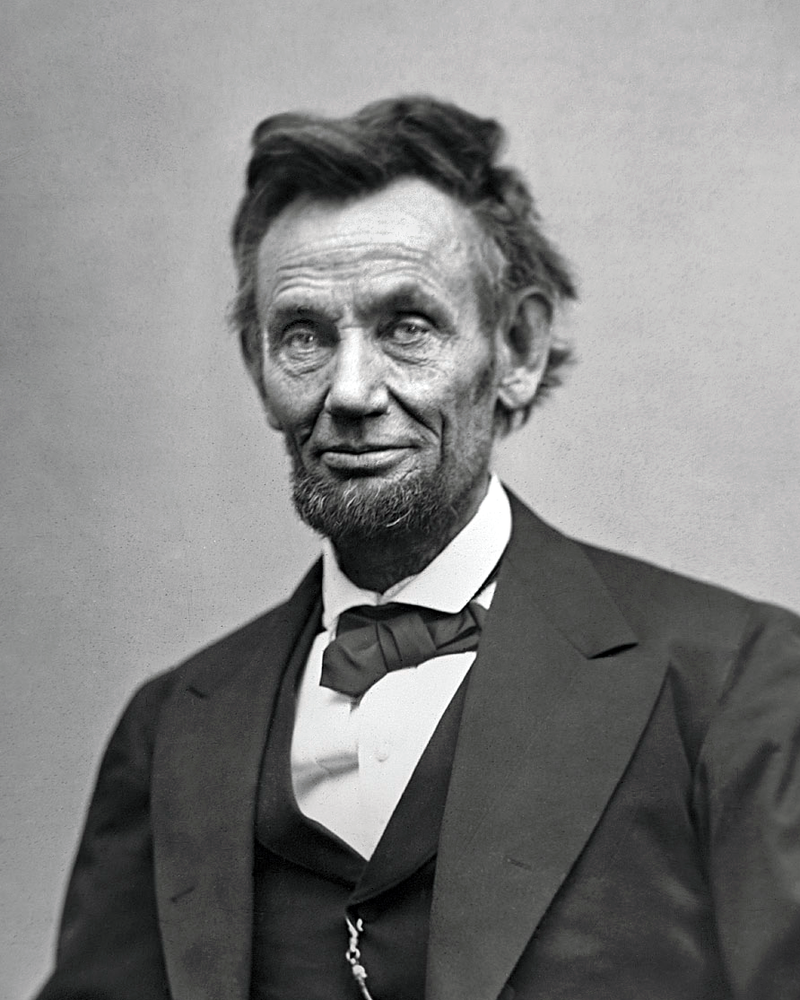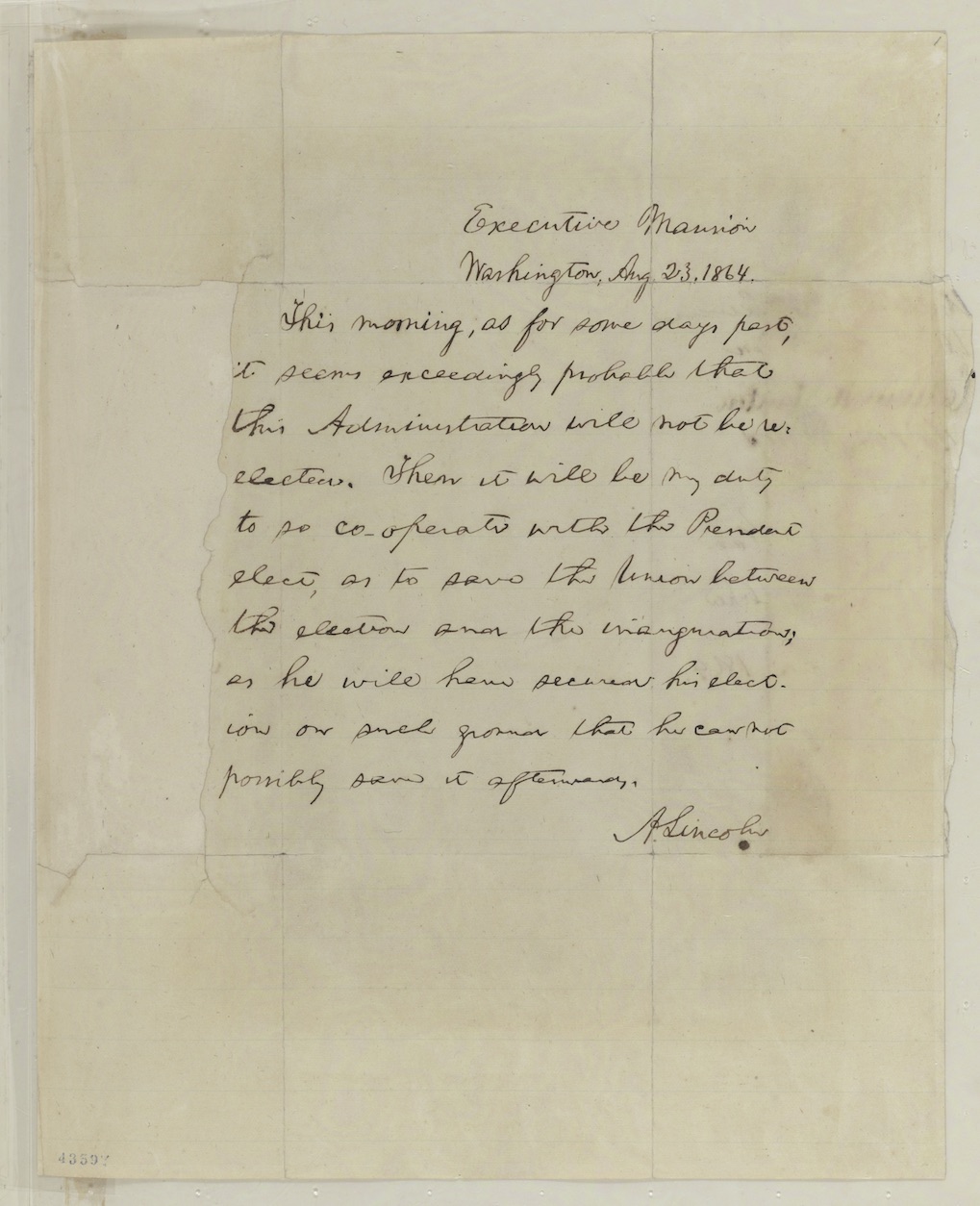“It seems exceedingly probable that this Administration will not be re-elected”
Most of us are familiar with the pessimistic “blind memo” Abraham Lincoln wrote on August 23, 1864, predicting his own defeat in the forthcoming election. I was searching online through the Library of Congress archives today and happened to come across a digital copy of Lincoln’s handwritten memo. It’s an extraordinary document, and I thought it would be neat to share. A transcription follows the JPG.
Executive Mansion
Washington, Aug 23, 1864.
This morning, as for some days past, it seems exceedingly probable that this Administration will not be re-elected. Then it will be my duty to so co-operate with the President elect, as to save the Union between the election and the inauguration; as he will have secured his election on such ground that he can not possibly save it afterwards.
A. Lincoln
[Endorsed on Reverse:]
William H Seward
W. P. Fessenden
Edwin M Stanton
Gideon Welles
Edwd. Bates
M Blair
J. P. Usher
————
A high-res version of the document can be found here at the Library of Congress.


An excellent analysis of Lincoln’s “Blind Memorandum” by Dr. Matthew Pinsker, Brian Pohanka Chair of Civil War History at Dickinson College, Carlisle, Pennsylvania , is attached herein:
thanks … have read it a bunch, but never seen the real deal.
The last clause was dark. Thank God it did not come to pass.
Chris, thank you for this post. Downloading the high-res png (both pages) and reading it is almost as good as holding the original document!
To the newspaper-reading public, it is not reality that matters; rather, it is perception of reality. As Will Rogers once quipped: “All I know is what I read in the papers.”
1863 ended auspiciously for Union Forces (and the overall Commander-in-Chief, President Lincoln.) Gettysburg, and then Vicksburg, which was followed soon after by Chattanooga (with Grant defeating Bragg and “sending him to Atlanta”) brought U.S. Grant to Washington and promotion to Lieutenant General. [As regards the 1864 Presidential Election, as reported in newspapers in December 1863, the Republican contest would likely boil down to Lincoln versus Salmon P. Chase; or possibly Lincoln or Chase versus a popular military contender: Grant or Banks.]
Chase remained in his Cabinet position as Secretary of the Treasury while jockeying for Republican Party nomination (that convention, now renamed “Union Party Convention” was held at Baltimore June 1864. The only men receiving votes being Abraham Lincoln and U.S. Grant.) At the end of June, having failed in his snatch at the Grand Prize, Chase resigned as Secretary of the Treasury (which is why W. P. Fessenden’s name appears on the “Blind Memo.”) Meanwhile, a rival “republican” convention was held at Cleveland Ohio in May: John C. Fremont was selected as nominee for this Radical Democracy Party.
1864 provided no Vicksburg or Chattanooga to Union hopes. Instead, there was USS Housatonic (sunk by an unknown Rebel assailant in February.) Spottsylvania Court House and Cold Harbor marked LGen Grant’s progress towards Richmond… and with most of the Union forces defending Washington removed, Confederate forces under Early approached the Federal Capital, but were delayed at Monocacy. Rebel newspapers on 25 July reported “Hood’s major Victory” against Federal forces besieging Atlanta: Northern newspapers repeated the Southern news, along with the claim that “popular Union General James B. McPherson was killed.” [The reshuffle of U.S. Army leadership resulted in nearly a week of delay in significant operations at Atlanta. On 23 August no one could see light at the end of the tunnel at Atlanta.] August then held promise for a significant victory in the Gulf of Mexico: RADM Farragut entered Mobile Bay, neutralized most of the Rebel warships and subjugated Forts Morgan, Powell and Gaines… but on 23 August 1864 Farragut’s Mobile campaign ended, without subjugating the important port city of Mobile.
As can be seen, three issues made Abraham Lincoln pessimistic about his political future on Tuesday 23 August: lack of recent, publicly acknowledged military victories; a Confederacy “in its death throes” refused to accept its fate; John C. Fremont as candidate for Radical Democracy Party was poised to split the Republican vote in November. And the sum of these issues likely resulted in President Lincoln crafting his “Blind Memo.”
Mike, I’d also add Years of grueling war with no foreseeable end, his changing policies on slavery and his bold use of executive power all threatened his popularity.
Plus the Grant’s Overland Campaign, which had jumped-off with high expectations that it would finish the war in 1864, had instead turned into a series of costly head-to-head battles across northern Virginia.
NYGiant1952
My above comment was posted as an attempt to make sense of “Why did President Lincoln feel [uninspired] enough to construct the Blind Memorandum?”
Momentum… or rather, LACK of momentum towards accomplishment of Lincoln’s military objectives seems to have played a crucial role.
After consulting period newspapers it became evident that in the public’s mind, “nothing had really happened since the storming of Missionary Ridge.” Peace advocates and copperheads (many of whom had little interest in ending slavery) gained prestige the longer the lack of noteworthy action endured. Late 1863 predictions by many Northern newspapers “of a successful conclusion of the war by end of Summer” must have appeared Pollyannish in their optimism to Lincoln in August 1864. And one of the Democrat Party talking points prior to opening the Chicago Convention on 29 August 1864 focused attention on President Lincoln’s abuse of Executive Power: with continued lack of identifiable military progress, this unwonted interest in Mr. Lincoln’s conduct as Chief Executive would only broaden, and perhaps gain acceptance by Lincoln’s less enthusiastic supporters.
Timing.
It is always darkest before the dawn. Events that transpired subsequent to the signing of the Blind Memo present as surprisingly fortuitous. In chronological order:
– George McClellan won nomination as Democrat Party Presidential candidate;
– William Tecumseh Sherman took possession of Atlanta;
– John C. Fremont withdrew from the Presidential race of 1864 (supposedly in exchange for the removal from Cabinet of his personal enemy, Montgomery Blair)
– Chief Justice Taney died on 12 October 1864. The vacant Supreme Court seat would not be filled until after the election… by Salmon P. Chase.
The Democratic Party Platform’s demand that immediate efforts be made for a cessation of hostilities, was also fortuitous.